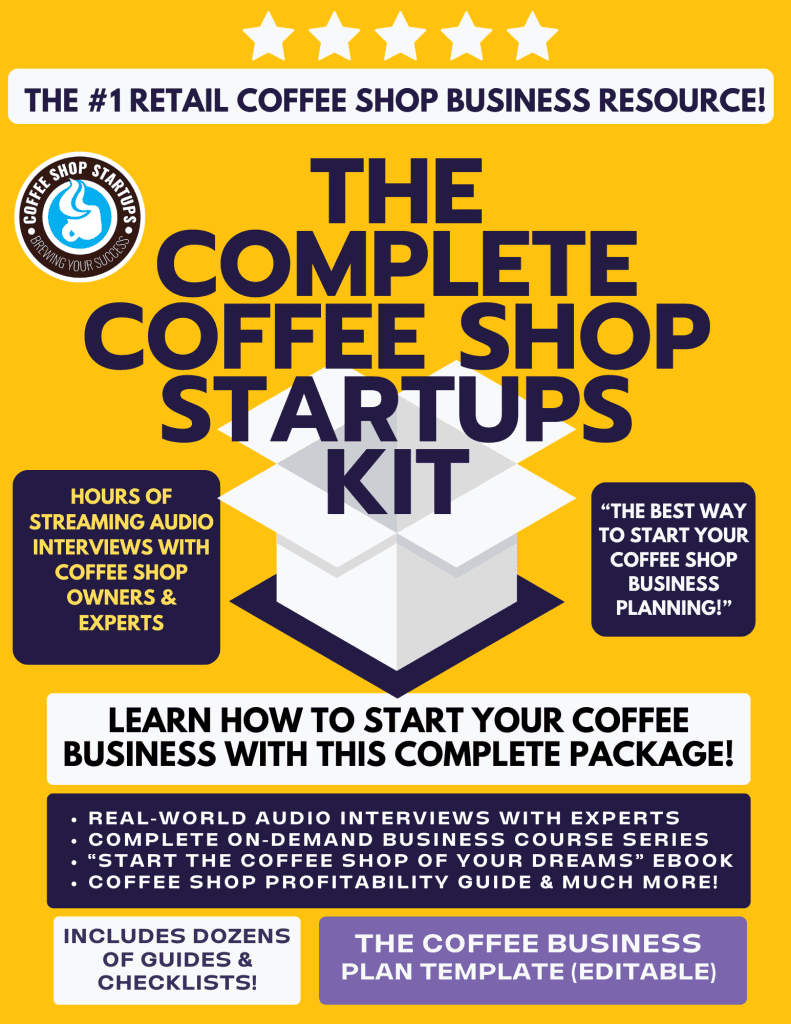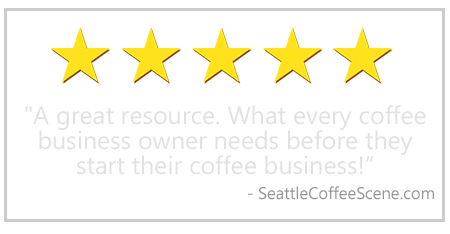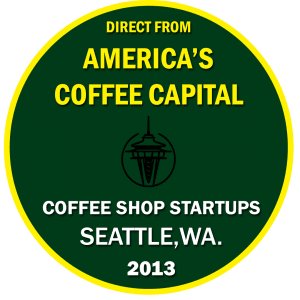Sell Coffee at Farmer's Markets

How To Sell Coffee at Farmers' Markets
Selling Coffee at Farmers' Markets to Start Your Business
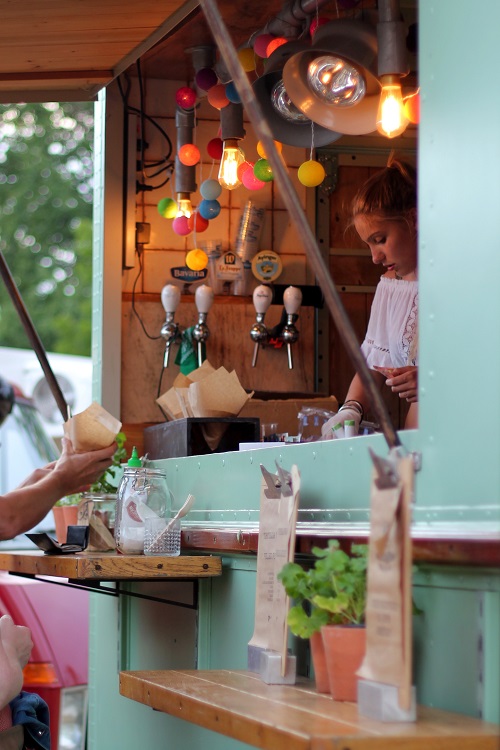 Selling coffee at your local farmer's markets can be an excellent way to start a small coffee business. We've previously listed the idea of selling coffee at farmer's markets as one of the low-cost ways to start a coffee business. Today, we want to spend a little more time detailing how to do just that.
Selling coffee at your local farmer's markets can be an excellent way to start a small coffee business. We've previously listed the idea of selling coffee at farmer's markets as one of the low-cost ways to start a coffee business. Today, we want to spend a little more time detailing how to do just that.
Whether you are a local coffee roaster or just interested in starting a coffee shop in the future, selling coffee at your local farmers' markets can be beneficial.
First, the direct to face-to-face interaction with customers on the street level can influence your thinking about your customer's taste preferences – and thus, what coffee you should try to offer.
Second, aside from coffee inventory expenses and your relatively small setup costs, there are not many risks involved in selling whole bean coffee at your local farmer's markets.
Third, selling coffee can be an excellent side-hustle that allows making money on the weekends while working your regular 9-to-5 during the week.
Forth, selling coffee in-person can help you sell coffee online as well. To be sure, selling direct and in person at farmers' markets always gives you instant credibility online and provides your offline customers a convenient way to reach you. For example, while you may sell coffee in person on Sunday, you may be generating online sales throughout the entire week.
In this post, we will detail how to sell coffee at your local farmers' market successfully.
Trending Articles on Coffee Shop Startups:
| Coffee Shop Ideas & Concepts | Coffee Shop Budget and Planning |
|---|---|
| 50 Coffee Shop Ideas & Concepts | 7 Ways to Open a Coffee Shop with No Money |
| Low-Cost Coffee Shop Ideas | Open a Coffee Shop Bookstore |
| How to Open a Drive-Thru Coffee Stand | How Much do Coffee Shop Owners Make? |
How to Sell Coffee at Farmers' Markets
If you are starting from square one, let's lay out the steps you want to take to get your coffee vending business started at your local farmers' market.
1. Define Your Coffee Business Concept
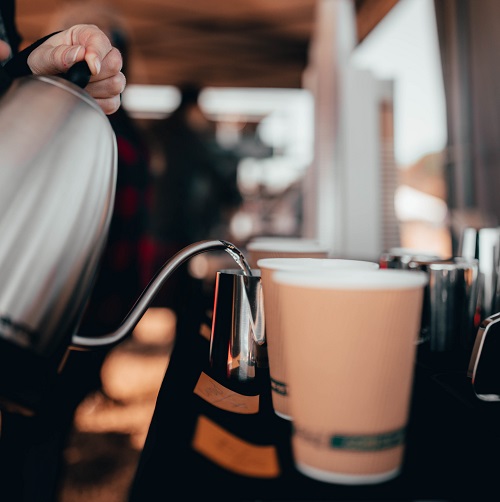 Determine what your coffee business will look like. Will you roast your own beans, or will you curate local coffee roasters' beans? Define your coffee business concept and determine your vision for future growth.
Determine what your coffee business will look like. Will you roast your own beans, or will you curate local coffee roasters' beans? Define your coffee business concept and determine your vision for future growth.
Remember that while you may not have a full brick-and-mortar café, selling coffee beans at farmers' markets is a real coffee business.
Selling coffee at farmers' markets can be an effective launching pad for future growth and a great way to develop your larger coffee business. Consider that selling coffee at a local farmers' market can play a significant role in your future retail coffee business aspirations.
Further Reading: 50 Best Coffee Business Ideas and Concepts.
2. Choose a Name for Your Coffee Business
Choose a name for your coffee business that's catchy, intriguing, and memorable.
Your name will be useful in many different settings, but ultimately it will set you apart from your competitors or other vendors.
Choose a coffee business name that will grow with you. As your business evolves, you may want your business's name to fit that growth. For example, if you grow into a mobile coffee business or a brick-and-mortar business, you may want to keep a name that will be familiar to your local customers.
3. Establish Your Coffee Business Structure
Once you choose your coffee business's name. Additionally, you may want to establish your business entity or legal structure with the secretary of state in your state.
Some people skip out on this and opt to do business as a sole proprietor. Being a sole proprietor means that you are running your coffee business as yourself. This may be fine in some circumstances, but it may impede your business.
Consider the options of what business entity you want to use going forward. I can say that establishing your business as a separate business entity, such as an LLC, will allow you to open a bank account, obtain an EIN from the IRS, as well as do other essential business functions.
4. Apply for Your Business License and Permits
Since you are selling coffee, you will need to obtain a local city license and reseller's permit. Depending on where you do business, the reseller's permit will allow you to buy wholesale coffee beans without incurring sales tax. You will want to check on this with your state tax agencies.
You must check with your local health department if you plan to serve coffee. The scope of your service may dictate what type of rules your business falls under with respect to local health regulations. You may still need to double-check your local health department if you aren't serving espresso or coffee.
Sell Coffee at Farmers' Markets

5. Choose a Wholesale Coffee Roaster
If you are not roasting your coffee beans, you will want to work with one or several local wholesale coffee roasters. Remember that wholesale roasters may not work with you or offer you wholesale prices unless you have a business license and reseller's permit.
This is the fun part! If you like a few local roasters, consider visiting with them and asking about their terms, wholesale costs, and other information. Determine your terms and practical matters such as delivery, pick-ups, types of coffee blends, etc.
Further reading: How to Choose a Wholesale Coffee Roaster.
6. Roast your Coffee Blends
If you decide to roast your own green coffee beans, consider where you will get your inventory. There are medium-sized to sizeable green coffee brokers from which you may get your coffee supply.
While this goes beyond the scope of this article, you will want to ensure that you have a safe place to roast your beans that is appropriately zoned.
Offering your coffee beans is an excellent way to develop your unique coffee blend that stands out in the marketplace.
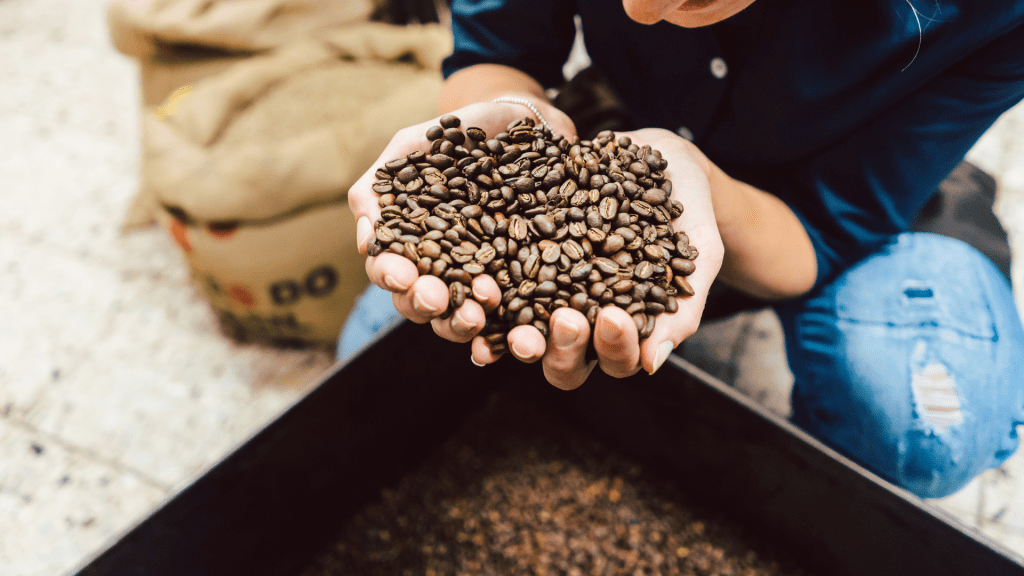
7. Choose Your Coffee Packaging
If you roast your coffee beans, I recommend that you spend time looking at your packing options. This would include coming up with an appealing and attention-grabbing logo and brand.
If you don't roast your beans, your wholesale roaster will provide you with their branded coffee bags and stickers. Your coffee packaging will impact your sales because it is one element that customers will judge your product before tasting your coffee.
8. Research Available Farmers Markets
Researching farmers' markets in your area is a must. Fortunately, even the smallest farmers' markets have some presence online to find information. Visit their website to figure out if they are currently accepting additional vendors. Many communities offer various farmers' markets throughout the entire city or county, with each market hosted on different days and locations.
Determine which location works best and sign up. However, I strongly recommend visiting the farmers' market first before sending in your application and fee. By visiting each market first, you will determine whether the market is a good fit for you and your coffee business.
If you think that the opportunity is ripe, then apply and send in your application and fee.
Sell Coffee at Farmers' Markets

9. Choose Your Coffee Equipment
If you sell coffee in a farmers' market setting, you will need some basic coffee equipment. Depending on the market or location, you may need to provide your own tables, chairs, and a pop-up tent. You may want to invest in display units and rubber bins. If you are able to brew, you may want to get an electric kettle, a coffee grinder, and a Chemex brewer.
Additionally, you will need a reliable portable POS system.
10. Determine Your Fixed and Variable Costs
How much will it cost to sell coffee at farmers' markets?
There are some upfront costs, such as establishing your legal business, applying for your business license, and market entry fees. You may also want to invest in banners, displays, and a website. These initial startup costs will vary from location to location, which is why I recommend doing some initial research first.
11. Open Up Your Social Media Accounts
If you haven't already done so, consider creating your social media accounts. Your social media accounts will be an important way to generate greater brand awareness, social sharing, and product accessibility.
To start, consider taking high-quality photos of your beans, cups of coffee, latte art, or you working at your farmers' markets – and post regularly. Even if you are not completely up and running yet, let customers know that you will be offering coffee at your farmers' market soon.
13. Get a Coffee Business Website
Having a coffee website with a shopping cart will be essential for your business's profit margins.
While you may be working at one or two farmers' markets every week, you can still be selling coffee online 24/7. This will help compound your time and effort to sell as much coffee as possible throughout the week.
Setting up your coffee website and shopping cart is, fortunately, straightforward. We've written an article about how to sell coffee online that is worth a read.
14. Promote Yourself (And Your Coffee!)
You will have many opportunities to promote your coffee business with face-to-face interactions, but you can do several things to promote your business effectively.
First, have a couple of banners made. The first banner should hang off the table facing your customers. Make your name and what you are selling bright and eye-catching. Consider getting banners that have reinforced holes with metal grommets sewn so you can affix them tightly with bungee chords. Another banner could be placed behind you and attached to your pop-up tent.
You can hand out business cards with a special discount. Additionally, you can ask your customers for their emails to contact them directly when you get new roasts for sale.
Make A-frame signs. These are perfect for placing around your tent to let people know that great-tasting coffee beans are nearby.
Developing your website, collecting emails, and having a social media presence are great avenues to promote your coffee business. You might also print out business cards, t-shirts, and coffee mugs to promote your brand.
How Do You Sell Coffee at Farmers' Markets?
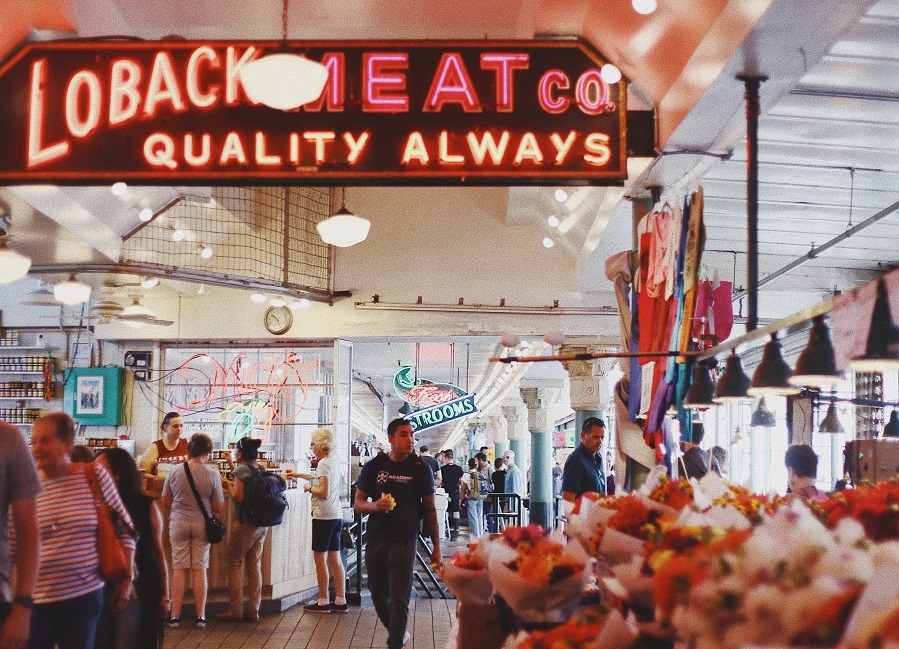
15. Look Towards Expansion
Selling coffee at farmers' markets can be a significant first step into retail coffee. However, you might want to grow out from there and serve espresso as well. Perhaps you would like to have a mobile coffee truck business or open up a drive-thru coffee stand.
There are plenty of ways for you to expand your business once you've already established your business. You might want to broaden your farmers market business to other markets on the same day; this may mean hiring employees and growing your business that way.
16. Consider The Competition
Competition is everywhere at marketplaces. Places like Seattle, San Francisco, and New York have ultra-competitive retail coffee environments. But even in smaller or medium-sized cities, you will find heavy competition. Like any business, you will have to consider who and what your threats are.
Your competition could come from other coffee roasters who would like to enter into the retail coffee business or from other coffee shops in the area looking for a new place to serve customers.
Be aware of your competition and always consider how you can offer customers something different. Find ways to differentiate yourself by listening to your customers and always keeping an eye out for opportunities.
17. Increase Your Profit Margins
You start a coffee business to be profitable. Maximizing revenue will be based on three things:
- Sales volume
- Profit margin
- Reducing costs
Your goal should be to sell as much coffee as possible. You can do this by attending one or more farmers' markets throughout the week and selling coffee online. You will want to maximize your profit on each sold item, which may mean charging a premium for each bag of coffee. Of course, if you sell too high, you may discourage sales.
Finally, always look for ways to reduce your fixed and variable costs. A significant expense is always going to be shipping. Ask your customers to buy online but pick up at the market to avoid the shipping costs.
![]()
Selling Coffee at Farmers' Markets
Related Questions:
How much money can I make selling coffee at farmers' markets?
Before you learn how to sell coffee at farmers' markets, we realize that you will be interested in determining how much money you will make. Indeed, selling coffee at farmers' markets can be profitable, but it requires sales volume. The more sales you have, the more revenue you will make.
Your real-life customers will be able to help you sell online, which will play a significant role in your profitability. A person who knows you, and your coffee and is happy with their purchase will have a high likelihood of buying from you again – either at the next market date or online.
Generating more sales will come from your ability to promote your coffee throughout the week beforehand. Getting customers in front of your booth will allow you to sell other items as well. These items can help drive your sales north. For example, you might also sell tea, pastries, coffee mugs, or branded merchandise.
![]()
Sell Coffee at Farmers' Markets
Selling coffee at farmers' markets is an excellent low-cost coffee shop idea. In addition to generating income, it can serve as a great way to develop your brand awareness, establish a relationship with vendors, and serve as a springboard to a more significant coffee business.
We've got plenty more ideas – consider reading our recent article, Low-Cost Coffee Shop Business Ideas and Concepts.
Other Coffee Business Articles:
How to Start an Online Coffee Business
Best Way to Sell Coffee Online
How to Setup Your Coffee Shop Website
How to Sell Coffee at Farmers' Markets Summary
As you can imagine, there are so many possibilities for selling coffee beans and other coffee-related products at your local farmers' market.
Remember:
- Start checking out local farmers' markets early.
- Determine what permits you will need to sell coffee.
- Decide where you will buy your wholesale coffee beans.
If you decide to sell coffee at a farmers' market, there are a few important things you can do to get your low-cost coffee business off the ground.
Let's summarize how to sell coffee at farmers' markets with the list below:
- Define Your coffee business concept.
- Choose a name for your coffee business.
- Apply for your business license and permits.
- Choose a wholesale coffee roaster.
- Roast your coffee blends.
- Choose your coffee packaging.
- Collaborate with a coffee roaster.
- Research available farmers' markets.
- Choose your coffee equipment.
- Determine your potential expenses.
- Open up social media accounts.
- Get a coffee business website.
- Promote your coffee business.
- Look towards expansion.
- Consider the competition.
- Increase profit margins.
We hope that this list allows you to get your mind thinking about how you can set up your coffee business at your local farmers' markets. If you have any more questions, feel free to send us an email. We'll be glad to help!
Are You Ready To Get Started?
Unlock Your Dream Coffee Shop Business with Our Exclusive Coffee Shop Startups Kit!
Ready to transform your passion for coffee into a thriving business? Look no further! Our Coffee Shop Startups Kit is your key to brewing success. Here's why you can't miss this opportunity:
![]() 35-Lecture Coffee Shop Business Course: Our kit provides a comprehensive A-to-Z lecture series that covers what you should know and how to plan your coffee business. No more guesswork – follow our proven roadmap for success.
35-Lecture Coffee Shop Business Course: Our kit provides a comprehensive A-to-Z lecture series that covers what you should know and how to plan your coffee business. No more guesswork – follow our proven roadmap for success.
![]() Comprehensive Coffee Shop Business Guide: Our kit includes a detailed, step-by-step guide that takes you from creating your concept to your grand opening.
Comprehensive Coffee Shop Business Guide: Our kit includes a detailed, step-by-step guide that takes you from creating your concept to your grand opening.
![]() Expert Interviews and Insights: Benefit from insider tips and industry secrets that successful coffee shop owners and experts share during one-on-one interviews. Learn from the best to stay ahead of the competition.
Expert Interviews and Insights: Benefit from insider tips and industry secrets that successful coffee shop owners and experts share during one-on-one interviews. Learn from the best to stay ahead of the competition.
![]() Business Essentials: We provide business plan templates, checklists, and resources to streamline your startup process. From permits to menu planning, we've got you covered.
Business Essentials: We provide business plan templates, checklists, and resources to streamline your startup process. From permits to menu planning, we've got you covered.
![]() Cost-effective Solutions: Save time and money with our expert advice and budgeting tips. Maximize your ROI and minimize headaches.
Cost-effective Solutions: Save time and money with our expert advice and budgeting tips. Maximize your ROI and minimize headaches.
![]() Adaptable to Any Setting: Our kit is designed to suit various locations and customer demographics, whether you're eyeing a trendy urban spot or a cozy corner in a suburban neighborhood.
Adaptable to Any Setting: Our kit is designed to suit various locations and customer demographics, whether you're eyeing a trendy urban spot or a cozy corner in a suburban neighborhood.
Includes Exclusive BONUS Material!
👉 Order Now and Begin Your Journey!
Don't let the complexities of starting a coffee shop overwhelm you. Our Coffee Shop Startups Kit is your ticket to entrepreneurial success. Take the first step towards owning a profitable and fulfilling coffee business today.
Join the thousands of successful coffee entrepreneurs who started with a dream and a great plan. Your journey to coffee shop greatness begins right here!
Comprehensive. Proven. Affordable.
The Complete Coffee Shop Startup Kit
(Instantly Delivered To You)
* The information on this page is for educational purposes only. We do not offer legal advice.


